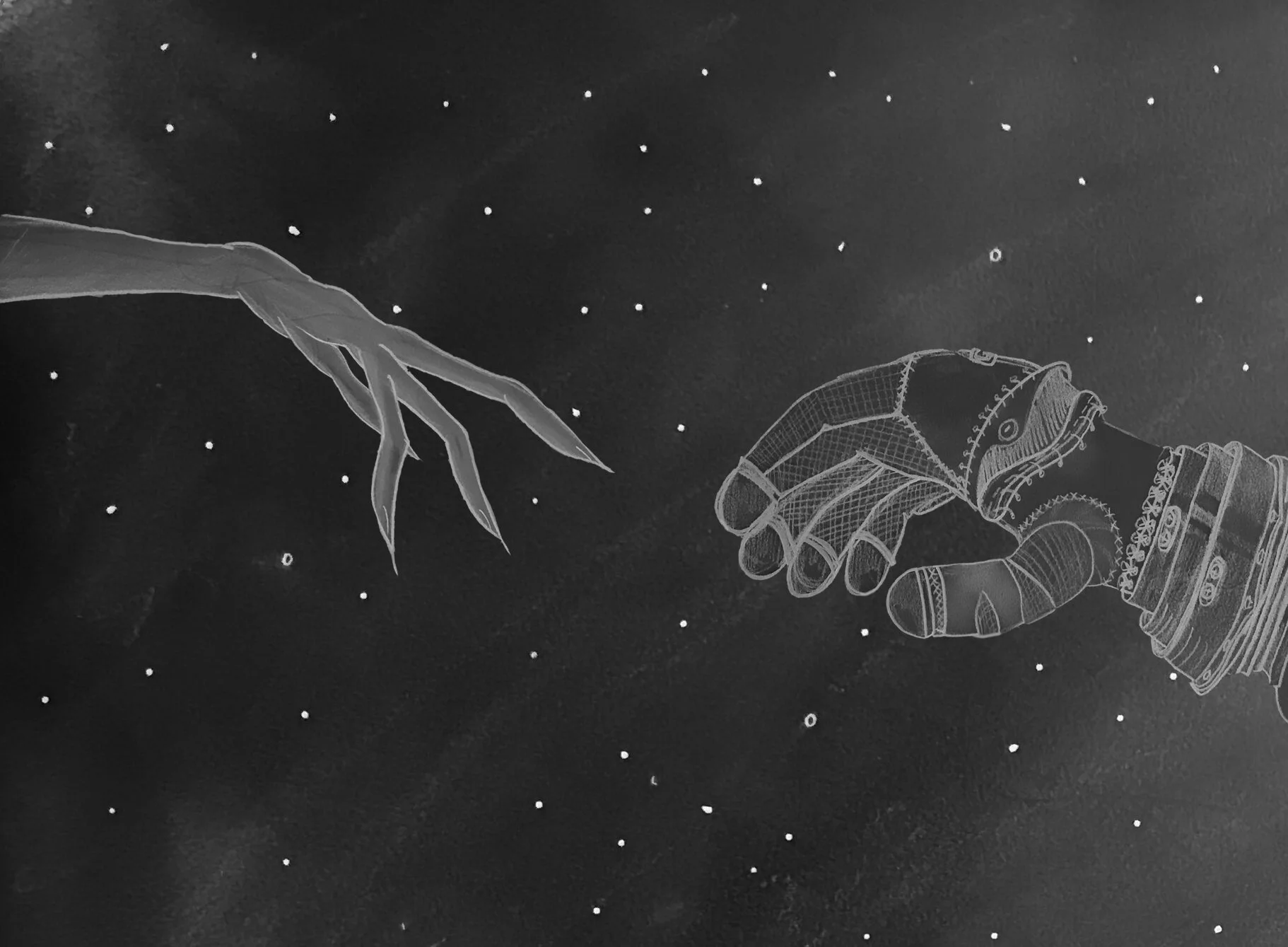InterPlanetary Transmissions: Stardust
Nebula over Rock Formation. Kyle Goetsch. unsplash.com/photos/VxaZjhobxFw; Rappelling between Two Hundred-Foot Walls. Blake Cheek. unsplash.com/photos/N50XXKaPnII. Weaving by Kayla Savard.
Prepare for landing: “InterPlanetary Transmissions: Stardust” is headed to bookshelves near you.
This newest book from the SFI Press is a record of the proceedings of the second annual InterPlanetary Festival, which drew more than 8,000 people to the Railyard Park in Santa Fe, New Mexico June 14-16, 2019. The weekend festival, part of the Santa Fe Institute’s larger InterPlanetary Project and nicknamed “Stardust,” invited panelists and participants into conversations about the big obstacles standing between us and life on other planets.
Because the summer of 2019 also marked the 50th anniversary of the historic Apollo 11 moon landing, manned missions to space was at the forefront of the Festival’s conversations. Whereas the inaugural InterPlanetary Festival in 2018 grappled with very big questions about space in general, “Stardust” centered on humanity’s future in space and celebrated humanity’s astounding accomplishments thus far.
“We’re living on a very densely populated Earth where the implications of a single individual’s actions percolate across the whole planet,” says David Krakauer, SFI President and co-editor of the new book. “Space is a laboratory for us to get things right.”
The “Stardust” panels explored how psychological elements in a team, or design decisions in a city, can have direct and dramatic impacts. One idea can limit advancement for decades. One player’s creativity has the power to change the entire mechanism of a game. One unexpected chemical reaction might manifest life where it had never existed before. In 2018 and 2019, the InterPlanetary Festival served as a zealous, if cautionary, simulation engine for new societal structures, new economic paradigms, and new sustainable practices.
The InterPlanetary Project wonders: Could humanity be united by the challenge of extrasolar exploration? And through that off-planet exploration, what solutions might we find for our Earthly troubles?
Now, in Summer 2020, it seems we’ve found a similar challenge in COVID-19. It’s a global catastrophe, not a speculative fantasy, that has demonstrated how entangled and broken our planetary systems are. A microscopic scourge has sent ripples through our bodies, relationships, healthcare systems, economies, policies, and atmosphere. Our survival depends on a collective effort to intervene on COVID-19’s rampage by eliminating any paths we can in its various networks, across all scales — we shelter in place, wear masks to protect one another, and no longer gather in large groups. At SFI, we cancel 2020’s InterPlanetary Festival and reflect upon the fragilities of our systems that got us to this place, in an effort to correct them and move on. Perhaps the thought experiments that took place in “Stardust” might help us in this endeavor. Those thought experiments, as well as the chapter introductions written for this book, speak directly to some of the most urgent concerns we face amid this global pandemic.
Panelist and speculative fiction author Rebecca Roanhorse, who penned a new introduction for this volume, remarked in the “World Building” panel that her choice to center Navajo peoples in her books celebrates their resilience, a point made even more poignant now that the Navajo Nation is suffering from the highest COVID-19 infection rate in the country. In the “Creative Black Futures” panel, Marcelline Mandeng and Cyree Jarelle Johnson highlighted Black proximity to death due to hereditary diseases and lack of access to life-saving materials — striking observations as we watch the disproportionate way with which Black populations are impacted by this pandemic, and how especially dangerous it is to those with pre-existing conditions. During the “Time” panel, Colleen Murphy discussed her work on de-aging the alien-esque roundworm C. elegans to prevent the onset and severity of disease — timely research as COVID-19 strikes with particular lethalness in the elderly. In the “Extremophile Cities” panel, we see how dense, urban environments are often hit hardest by diseases, both now and during the mid-19th-century cholera outbreak in London.
In this era of COVID-19 as the world’s citizenry practices social distancing and stay-at-home measures, in this time of extreme global groundedness, we still feel the pull of two sometimes-seemingly incongruous desires. “The first is the conscious effort to design solutions for problems that threaten our planetary citizenship,” writes Caitlin McShea, co-editor and InterPlanetary Project Director, in the book’s introduction. “And the other is an ever-present veneration for an alluring, exotic, and unfamiliar life in space, where the plagues of Earth won’t be as easily felt.”
InterPlanetary Transmissions: Stardust
Edited by David C. Krakauer and Caitlin L. McShea
$9.99 (Paperback); $2.99 (eBook)
Publisher and imprint: SFI Press Compass Series
251 pages
Paperback ISBN: 978-1-947864-32-0
Ebook ISBN: 978-1-947864-34-4
Publication Date: July 8, 2020
Available on Amazon.com


